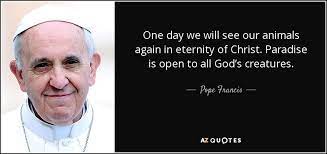Growing Up Catholic in a Small Texas Town: My Middle Name is Evelyn
I really like Pope Francis. I can relate to him. He keeps things simple. He never preaches fire and brimstone. He’s always happy and positive, always looking on the bright side. What’s not to like?
Here are three things you might not know about him.
Number one: It hasn’t been officially documented that Pope Francis believes animals go to heaven, but after reading a few of his quotes, I believe the implication is there.
· “We have only one heart, and the same wretchedness which leads us to mistreat an animal will not be long in showing itself in our relationships with other people. Every act of cruelty towards any creature is contrary to human dignity.”
· “When our hearts are authentically open to universal communion, this sense of fraternity excludes nothing and no one. It follows that our indifference or cruelty towards fellow creatures of this world sooner or later affects the treatment we mete out to other human beings.”
· “Every act of cruelty towards any creature is ‘contrary to human dignity.’”
Number Two: He also has a refreshing view of women.
· “This is a society with a strong masculine attitude. It lacks a woman’s touch. It is just that man does not bring harmony. It is she who brings that harmony, to love tenderly, and who makes of the world something beautiful.”
· “Women’s involvement in decision-making is valuable for the good of the world.”
· And this one: “Women are to be guaranteed freedom of choice.”
Number Three:
Pope Francis believes that every day Jesus prays for each one of us by calling out our names. Wow! All 7.888 billion of us! I spoke to him the other day, Jesus, not the Pope, to make sure he knows Kaska is pronounced with a hard K. And because there’s more than one Kathleen Kaska out there, that my middle name is Evelyn.

